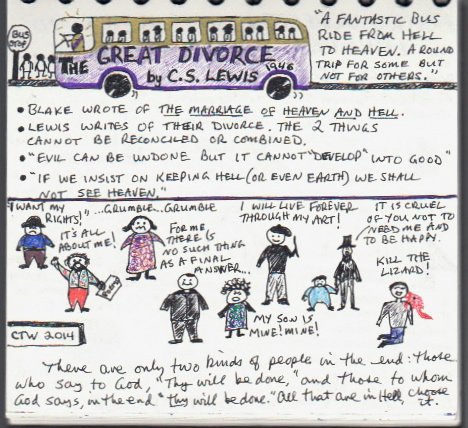Book Review: The Great Divorce by C.S. Lewis
Sketch by Clare T. Walker. Copyright 2014.
The phrase “bus ride from hell” no doubt conjures up bad memories of trips to and from school on the big yellow bus, or perhaps visions of a cross-country journey you would rather forget. But in his 1946 book The Great Divorce, C.S. Lewis really means a bus ride from Hell. The book begins with the narrator boarding a bus in the mean streets of the netherworld and taking a trip that will determine his eternal destiny.
After the narrator boards the bus, it takes off into the sky. Before it reaches its destination, the narrator has endured the sob stories of two fellow passengers and witnessed an all-out brawl on board.
Their destination is a grassy plain on the summit of a high cliff. When the passengers disembark, they discover that they are all nearly transparent, like ghosts. Soon, however, a large crowd of “real” people—solid people—comes to meet them. The narrator witnesses a few encounters between ghosts and solid people before meeting his “own” solid person, a man named George Macdonald, named by Lewis after the 19th-century Scottish author of the same name. Macdonald serves as the narrator’s guide to the afterlife, similar to the way Virgil guided Dante in The Divine Comedy.
One of the things I love about C.S. Lewis is his uncanny understanding of human nature, especially the ways we deceive ourselves and rationalize our bad behavior, everything from run-of-the-mill pettiness, to desire to control others, to attachment to comforts and addictions, even to the murderous impulses that lead to the worst atrocities in human history. They’re all there, on that plateau, being given the opportunity to choose their fate once and for all. The solid people are glorified human beings sent from Heaven to counsel the ghosts and help them shed the things that are keeping them from God. Some of the ghosts, under the gentle encouragement of their solid guides, do indeed make the choice to surrender to God, at which point they transform into glorified beings themselves. Some of the ghosts refuse God’s love, continue in their stubborn self-will and eventually return to Hell by their own choice. As Lewis says, “There are only two kinds of people in the end: those who say to God, ‘Thy will be done,’ and those to whom God says, in the end, ‘thy will be done.’ All that are in Hell, choose it.”
Lewis’s masterpiece “theological fantasy” is a quick read (my paperback edition is only 128 pages long) but sobering: it’s hard not to see oneself in the self-absorbed Poet, or the Bishop who knew it all but rejected God, or the Woman With a Martyr Complex who wanted her deceased husband to leave Heaven so she could continue to “fix” him in Hell, or the Devoted Mother whose love for her son became a dismal obsession.
Like all Lewis’s books, this one could change your life. Highly recommended.
If you’d like to purchase your own copy, please consider clicking through by Bookshop.org shop and scrolling down to the C.S. Lewis section. It’s an affiliate link, which means your purchase helps support this site! How? You get a discount on your purchase, and Bookshop.org sends me a small sales commission in appreciation for sending you their way. Thanks for your support!
